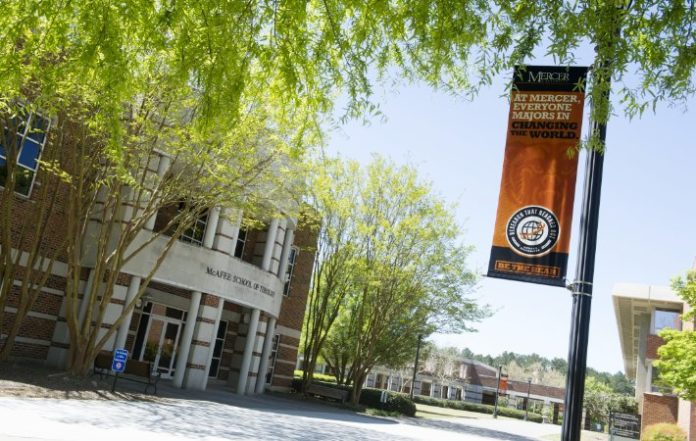ATLANTA – Mercer University’s James and Carolyn McAfee School of Theology has been recognized as a “Seminary that Changes the World” for 2017-18 by the Center for Faith and Service, based out of McCormick Theological Seminary in Chicago, Illinois.
For each of the past five years, the Center has identified a select group of seminaries and divinity schools offering innovative courses, programs and opportunities for students seeking to engage in social justice and service work while in seminary.
McAfee’s recognition as a “Seminary that Changes the World” reflects the School’s ongoing work to influence racial reconciliation, foster interfaith dialogue, teach community development and launch well-rounded ministers.
The School offers two merit-based scholarships – the McAfee Leadership Scholarship (full tuition) and the McAfee Legacy Scholarship (80 percent tuition) – for students who have shown exemplary academic skill in their undergraduate work and great promise for ministry in a variety of settings, as well as a number of degree programs, such as the M.Div. in Christian Ethics, M.Div. in Global Christianity and M.Div. in Community Development, that uniquely integrate faith and service.
McAfee’s location on Mercer’s Cecil B. Day Campus in Atlanta allows the opportunity for students to engage with peers from a variety of backgrounds and cultures. Additionally, they participate in a number of local and global outreach efforts, including teaching in a Certificate for Theological Studies program at Arrendale Prison for Women, participating in an annual international Mission Immersion Trip and hosting programs promoting interfaith dialogue and peace.
McAfee’s Interfaith Prayer Garden was constructed in 2015 in collaboration with the Cooperative Baptist Fellowship of Georgia and was primarily funded by a local Muslim businessman in memory of his parents. The garden is open to members of all faiths and serves as a place for reflection, prayer and fellowship. Student James Blay has worked with international students who represent a wide variety of faith traditions in other schools on Mercer’s campus by taking them shopping, finding language partners to speak with them and helping to sponsor a Thanksgiving dinner with them.
The School also offers a number of issue-integrated academic courses, such as Mission Methodology and Practice, Restorative Justice, and Ethics, Law and Public Policy.
“It is an honor for our school, once again, to be recognized as one of the ‘Seminaries that Change the World,’” said Dr. Jeff Willetts, dean of the School. “It is confirmation that the McAfee School of Theology continues to live into its motto of ‘Changing lives and transforming communities.’”
The Center for Faith and Service is an organization that works to help seminaries, service programs, denominations and local congregations connect faith with service and social justice work. For more information about “Seminaries that Change the World,” visit www.faith3.org.
About the Center for Faith and Service
Based out of McCormick Theological Seminary in Chicago, Illinois, the Center for Faith and Service works to develop new programs and identify existing resources that support the church to be present and relevant in the lives of young adults. Through a variety of initiatives, including “Seminaries that Change the World,” the Center partners with seminaries, summer camps, colleges, youth corps, denominations and local congregations to create programs and resources that help young people connect their passions for service and justice with their faith.










